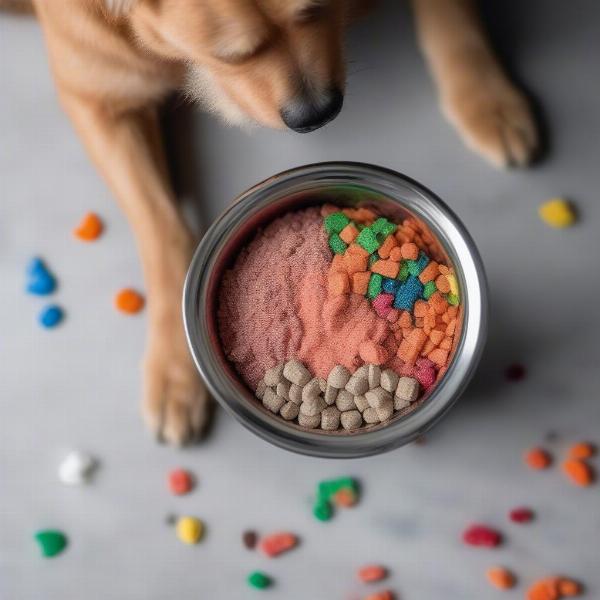Meal mixers for dogs offer a convenient and effective way to enhance your furry friend’s diet. Whether you’re looking to address picky eating, supplement a homemade diet, or simply add a boost of flavor and nutrients, meal mixers can be a valuable addition to your dog’s mealtime routine. Understanding the benefits, different types, and how to choose the right mixer for your dog’s specific needs is essential.
Understanding the Benefits of Meal Mixers
Meal mixers are designed to complement your dog’s existing food, providing an extra layer of nutrition and palatability. They can be especially beneficial for picky eaters, enticing them to finish their meals. For dogs with specific dietary needs or allergies, meal mixers can offer targeted nutrients without compromising on taste. Additionally, they can be a convenient way to support a homemade diet, ensuring your dog receives a balanced intake of vitamins and minerals.
For senior dogs, meal mixers can help stimulate appetite and provide the necessary nutrients for maintaining muscle mass and overall health. Similarly, puppies can benefit from the extra boost of vitamins and minerals found in many meal mixers, supporting their growth and development.
 Meal Mixers for Picky Eaters
Meal Mixers for Picky Eaters
Different Types of Meal Mixers for Dogs
A variety of meal mixers cater to different needs and preferences. Some popular types include:
- Freeze-dried raw: These mixers offer a convenient way to incorporate the benefits of raw feeding without the hassle of preparation.
- Dehydrated: Dehydrated mixers are shelf-stable and easy to rehydrate, providing a concentrated source of nutrients.
- Powdered supplements: Powdered mixers can be easily sprinkled over food, offering a boost of vitamins, minerals, or other targeted nutrients.
- Broths and gravies: These mixers add moisture and flavor, making dry kibble more appealing.
- Homemade blends: You can create your own meal mixers using ingredients like cooked meat, vegetables, and healthy fats.
Choosing the Right Meal Mixer for Your Dog
Selecting the right meal mixer depends on your dog’s individual needs and preferences. Consider factors such as age, breed, activity level, and any existing health conditions. Consult with your veterinarian to determine the best option for your dog’s specific requirements.
Always check the ingredient list to ensure the mixer is free of any potential allergens or ingredients that your dog may be sensitive to. Look for high-quality ingredients and avoid fillers, artificial colors, and preservatives.
Is it Okay to Mix Wet and Dry Dog Food?
Absolutely! Mixing wet and dry dog food can offer a variety of benefits, including increased palatability and hydration. It also allows you to customize your dog’s meals based on their individual needs and preferences.
How to Introduce a Meal Mixer to Your Dog
Introduce the meal mixer gradually to avoid digestive upset. Start by adding a small amount to your dog’s regular food and gradually increase the proportion over several days. Monitor your dog’s stool for any changes and adjust the amount of mixer accordingly.
Conclusion
Meal mixers offer a valuable way to enhance your dog’s diet, providing a boost of nutrition and flavor. By understanding the different types available and choosing the right one for your dog’s individual needs, you can help ensure they receive a balanced and enjoyable mealtime experience. Remember to consult with your veterinarian for personalized guidance.
FAQ
- Are meal mixers necessary for all dogs? No, meal mixers are not strictly necessary, but they can be beneficial for picky eaters, dogs with specific dietary needs, or those on homemade diets.
- Can I make my own meal mixers? Yes, you can create homemade meal mixers using wholesome ingredients like cooked meat, vegetables, and healthy fats.
- How much meal mixer should I give my dog? Follow the manufacturer’s instructions or consult with your veterinarian for the appropriate amount.
- Are there any side effects of using meal mixers? Some dogs may experience digestive upset if introduced to a new food too quickly. Introduce gradually to avoid this issue.
- Where can I buy meal mixers for dogs? Meal mixers are available at pet stores, online retailers, and some veterinary clinics.
- Can puppies eat meal mixers? Yes, but choose a mixer specifically formulated for puppies and consult with your veterinarian.
- Are meal mixers good for senior dogs? Yes, meal mixers can be beneficial for senior dogs, helping stimulate appetite and provide essential nutrients.
ILM Dog is your trusted source for expert advice on dog care and nutrition. We offer a comprehensive range of resources covering breed selection, health care, training, nutrition, grooming, and much more. Whether you’re a new dog owner or a seasoned pro, ILM Dog has the information you need to provide the best possible care for your furry companion. Contact us today for personalized advice and support: Email: [email protected], Phone: +44 20-3965-8624. Visit us online at ILM Dog.